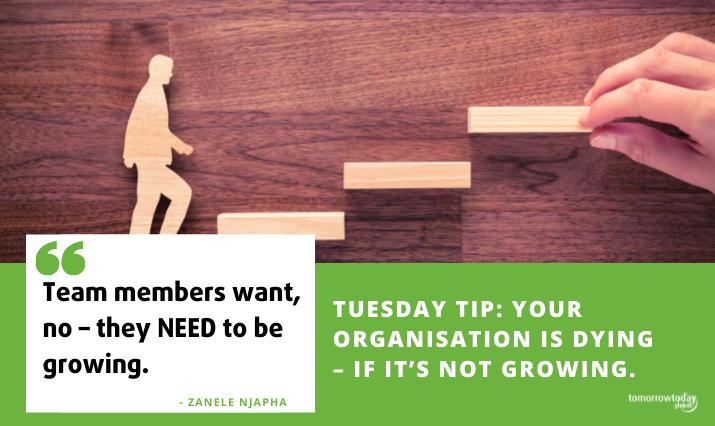How do we know when something is alive?
The study of Biology teaches that living things have seven key characteristics. Among the seven are: movement, reproduction, respiration, excretion and nutrition. Now although all of these are critical, I’d like to draw the remaining two to your attention: Sensitivity & Growth.
Growth can be defined as progression and changing from one stage to the stage that follows, NOT the stage before – that is regression – or ‘dying’. Sensitivity implies the awareness of external conditions and then reacting or responding with internal changes such as physical or systemic shifts that will increase chances of survival.
Is your organisation dying?
Wait. Not to scare you but think about it – if your organisation is not growing or exercising sensitivity – it just might be. I know what you’re thinking… the part that makes this a tough pill to swallow is the idea of the dreaded C word – change.
So why does change matter?
- What served us previously may not be what will help us today.
“Nobody ever crosses the same river twice. For it is not the same river and they are not the same person” – Heraclitus
As circumstances change, it is safe to assume that the nature of the business challenges we are faced with are completely new. Now although there will always be facets of the problem that can be ‘pattern-matched’ to another – it is not the same challenge.
It is therefore immensely important that although thousands of cases are presented to us daily that seem like ‘the same old thing’, we approach these with fresh eyes in lieu of an individual case’s unique complexity.
This comes down to building the muscle to craft customised solutions for challenges that are nothing like what we faced before.
- External forces will move ON you or remove you.
From changes in the economy, to technology-related disruption, to regulation and even institutional policies – there are constantly factors impacting how organisations operate, right down to the times team members check in on Monday morning.
Now because of this, as organisations, we are left with only two options: react or respond. React – instinctively move only when and as external circumstances dictate. Respond – Predict and adequately prepare for external circumstances.
- Your team needs you to.
A study published by the Society for Human Resource Management shows that when an employee leaves an organisation, it costs an average of 6-9 months of the former employee’s salary to not only find, but also onboard their replacement.
Team members want, no – they NEED to be growing.
If they are part of an organisation that prioritises their growth and development, they have a higher chance of staying and positively contributing to the organisation’s growth. These opportunities for growth unfortunately don’t come from the days when the ship is sailing smoothly, but from the days when they have to execute differently, manage an unforeseen crisis or perform at peak level under brand new leadership – growth and change are peas in a pod.
When team members get opportunities that require them to stretch and reach, they are better equipped for crafting the unique solutions I mentioned earlier and staying agile in a world of uncertainty.
Trust me, I know it all feels very overwhelming, as organisational change very often can.
So here are 5 helpful questions to ask, as you check your organisation’s ‘change temperature’ or tolerance for progress:
- What are our internal feelings about change?
- What does our company culture display about our appetite for change?
- What informs or drives any intolerance or resistance towards change?
- What systems would be helpful in preparing us better for our upcoming transitions?
- How can our leaders better support teams to develop a healthy appetite and keenness towards change?
Sensitivity and Growth are only two of the seven characteristics of living things.
Growth can be defined as progression and changing from one stage to the stage that follows, NOT the stage before – that is regression – or ‘dying’. Sensitivity implies the awareness of external conditions and then reacting or responding with internal changes such as physical or systemic shifts that will increase chances of survival.
I’ve always believed that an organisation is a living organism, so I’d like to challenge you to at least check off sensitivity and growth from the list – because progress is not only exciting, but necessary for survival.
References:
About the author of today’s Tuesday Tip – Zanele Njapha
In the face of disruptive change, Zanele, author of today’s Tuesday Tip, assists organizations to become future fit: adaptable, resilient, innovative, proactive and confident through helping them crack the unlearning code.
She does this by facilitating the understanding that learning, unlearning and relearning must be the crux and heart of an organisation’s DNA if they are serious about being future-fit.



Trackbacks/Pingbacks